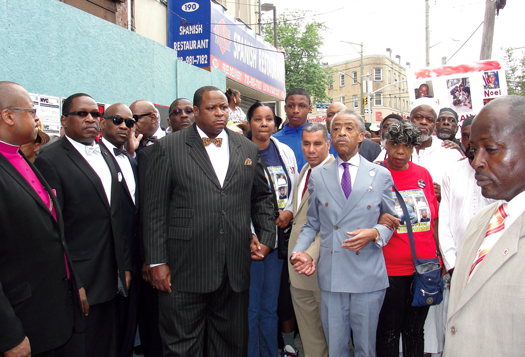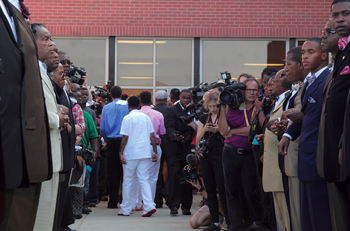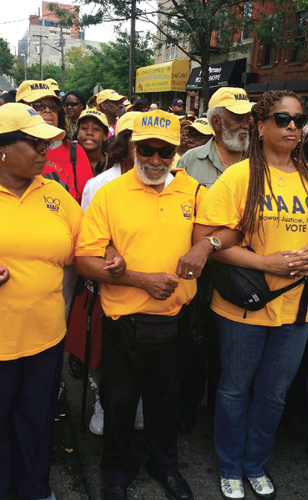
STATEN ISLAND, New York – Thousands recently marched in this borough to protest the killing of Eric Garner, 43, an unarmed Black man by police officers using a banned chokehold because they said he was selling cigarettes illegally and needed to be arrested.

While Ed Josey, president of the Staten Island chapter of the NAACP was pleased with the march, he wanted to talk about the need for a national movement to create laws to deal with police brutality.
“Don’t get me wrong,” he told The Final Call. “Marching and demonstrating is fine–we need a national unified type of organization that would deal with police brutality through the legislative process.”
“I don’t know if we have a national movement or organization that deals with police brutality, but I do know it is a national problem,” Dow Kevin Buford told The Final Call while waiting to join the marchers. Mr. Buford was one of two Staten Islanders that went to jail during 1999 protests demanding NYPD officers who killed Amadou Diallo, an unarmed Muslim immigrant in The Bronx, be arrested.
“We have been saying that more must be done from the beating of Rodney King to the killing of Eric Garner last month right here on Staten Island, and as a nation we are sitting on a powder keg,” Mr. Buford said Aug. 23.
In the coming weeks several town hall meetings and rallies are scheduled in different cities to discuss the way forward to deal with police brutality. The events included a “Rally for Justice” in Philadelphia called by the National Million Women’s March National Human Rights Commission and a National March on Ferguson Aug. 30 organized by the Justice for Michael Brown Leadership Coalition.

“This will be a call for a national mobilization as we are working to accelerate the pace of building a mechanism to deal with the issue of police brutality,” said Zaki Baruti, of the St. Louis-based Universal African Peoples Organization.
“We want to keep this issue of murdering our young Black men in the forefront of the national and international arena,” Mr. Baruti told The Final Call. There will be a call for fewer White officers patrolling Black communities, a call for establishing more Civilian Community Review Boards and better training for police officers that stop Black people disproportionately on a daily basis, said the longtime activist. He is also a member of the Justice For Michael Brown Leadership Coalition.
A national organization would deal with the deeper psychological and sociological issues such as lack of job opportunities, the court system and forcing legislators to appropriate tax dollars in a more equitable manner, Mr. Baruti added.
Rosa Clemente, a nationally recognized grassroots activist, had a police officer place a gun to her head while lying on the ground during the protests in Ferguson, Mo. She told The Final Call she sees “potential” for a national movement, but “we are not there yet.”
Youth are saying to elders that while they are not yet clear on what needs to be done, they are willing to resist oppression, Ms. Clemente said. “Our youth are so traumatized by what the cops are doing–wanting to become part of a national movement against police brutality–but they do not want to be led by the old guard,” Ms. Clemente commented.
There is a demand for a national movement for organizing against police brutality, said Sabrina Sample of the Philadelphia-based Peoples Underground for Revolutionary Progress. “I agree that the ‘millennials’ need a voice; and what we are working on now is trying to latch on to the ideas put forth by the older organizations.”
“There is a call for a one-day national boycott of White-owned businesses on Sept. 8 and that is a good first step in building the national voice against police brutality,” Ms. Sample said.
The Buy Black Economics Community Organization called for the boycott on their Facebook page, saying “this is a movement to re-educate, agitate and organize for solutions to create our economic advantage and Black Diaspora privilege.”
Bill Fletcher, Jr., a racial justice, labor and international human rights activist, believes at present there is no nationally coordinated effort to fight police brutality, but there are “a lot of individual efforts,” he said.
“But, I believe we need a national anti-lynching movement,” he told The Final Call. “When we talk about the killing of Trayvon Martin, we must place it in the context of a lynching. These extra-judicial killings by police officers are beyond police brutality.”
Citizen review boards necessary across the nation and efforts to establish them are important, Mr. Fletcher said.
Pam Africa of the International Concerned Family and Friends of Mumia Abu Jamal argues there is a need for a national registry of all of the police brutality cases. This would enable a committee to investigate the cases and come up with national solutions, she said.
Lawrence Hamm of the Newark-based Peoples Organization for Progress wants more federal monitoring of police departments. “Trayvon Martin shined the spotlight on the issues of police brutality, but we let the light go out,” he told The Final Call.
“Staten Island, known as ‘the forgotten borough’ will forever be known as fueling the national dialogue and actions to deal with law enforcement across the nation,” stated Student Min. Abdul Hafeez of Muhammad Mosque No. 7. “We need a national organization to deal with the mindset of law enforcement that from Trayvon Martin to Eric Garner continue to abuse their power.”












